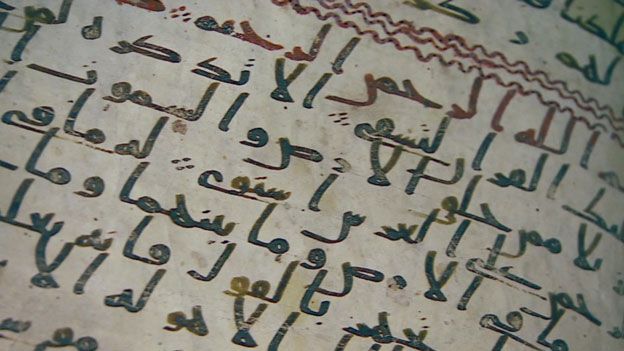 What may be the world's oldest fragments of the Koran have been found by the University of Birmingham. Radiocarbon dating found the manuscript to be at least 1,370 years old, making it among the earliest in existence. The pages of the Muslim holy text had remained unrecognised in the university library for almost a century.
What may be the world's oldest fragments of the Koran have been found by the University of Birmingham. Radiocarbon dating found the manuscript to be at least 1,370 years old, making it among the earliest in existence. The pages of the Muslim holy text had remained unrecognised in the university library for almost a century.The manuscript had been kept with a collection of other Middle Eastern books and documents, without being identified as one of the oldest fragments of the Koran in the world. When a PhD researcher, Alba Fedeli, looked more closely at these pages it was decided to carry out a radiocarbon dating test and the results were "startling". The tests, carried out by the Oxford University Radiocarbon Accelerator Unit, showed that the fragments, written on sheep or goat skin, were among the very oldest surviving texts of the Koran. These tests provide a range of dates, showing that, with a probability of more than 95%, the parchment was from between 568 and 645.
"They could well take us back to within a few years of the actual founding of Islam," said David Thomas, the university's professor of Christianity and Islam. According to Muslim tradition, the Prophet Muhammad received the revelations that form the Koran, the scripture of Islam, between the years 610 and 632, the year of his death. Prof Thomas says the dating of the Birmingham folios would mean it was quite possible that the person who had written them would have been alive at the time of the Prophet Muhammad. "The person who actually wrote it could well have known the Prophet Muhammad. He would have seen him probably, he would maybe have heard him preach. He may have known him personally - and that really is quite a thought to conjure with," he says.
The manuscript, written in "Hijazi script", an early form of written Arabic, becomes one of the oldest known fragments of the Koran.
Because radiocarbon dating creates a range of possible ages, there is a handful of other manuscripts in public and private collections which overlap. So this makes it impossible to say that any is definitively the oldest. But the latest possible date of the Birmingham discovery - 645 - would put it among the very oldest.
After Mohammed's death in 632, his first successor Abu Bakr, started the process of gathering existing copies of the Koran in order to bring them together in one version. This proces of canonisation was completed undr Uthman bin Affan, the third Khalifa, who reigned form 644 till 656.


.jpg)


No comments:
Post a Comment